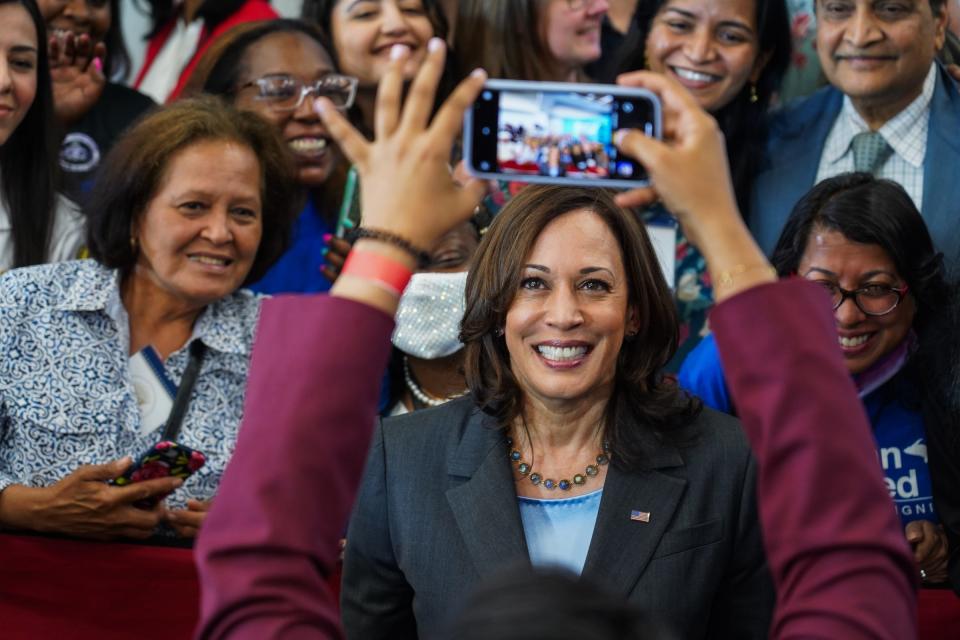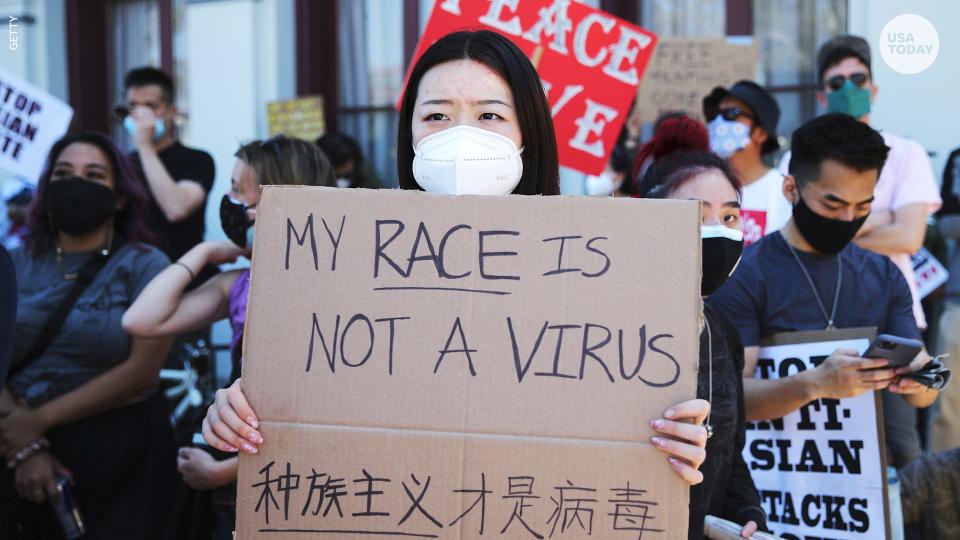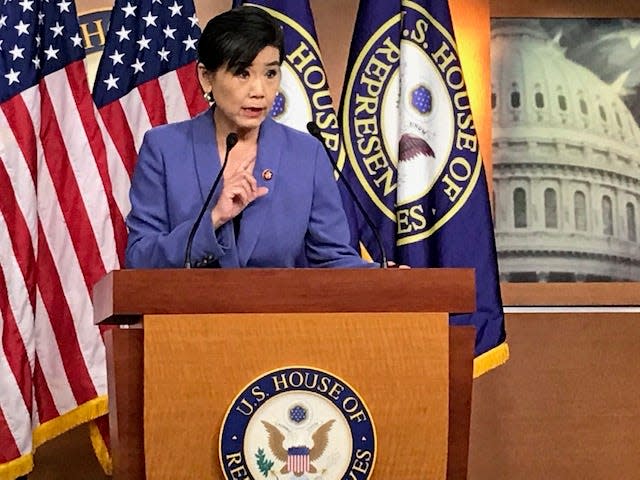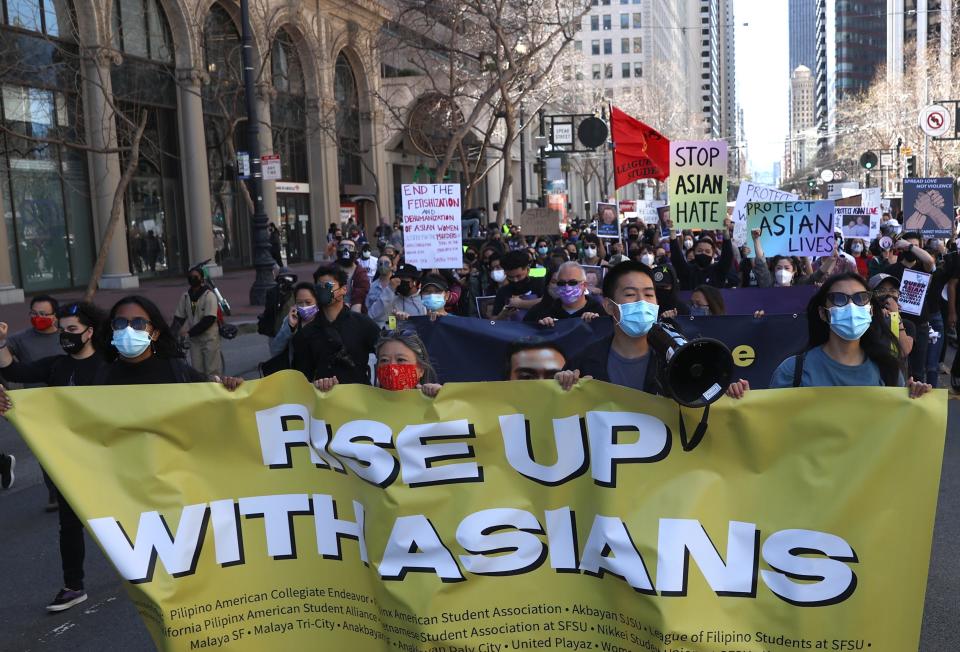Asian Americans, the nation's fastest-growing group, are winning political power in California and beyond
In July, California approved the groundbreaking Asian Pacific Islander Equity Budget, a $156.5 million package with victim support and mental health initiatives designed to counter decades of anti-Asian American racism and a spike in hate crimes during the COVID-19 pandemic.
That expenditure, the largest amount by far of any state passing similar legislation, is the latest symbol of the growing influence of California's 6 million Asian Americans.
"Because we have Asian American legislators, they have formed a strong force," said Russell Jeung, a professor of Asian American Studies at San Francisco State University and co-founder of Stop AAPI Hate, which tracks incidents of hate and discrimination against Asian Americans and Pacific Islanders. "They quickly recognized the issue of racism facing Asian Americans and they put their money where their mouth is in denouncing that racism and seeking to address it."

Asian Americans' political accomplishments in California could be a harbinger of political developments to come in other parts of the United States. Asian Americans were the nation's fastest-growing racial or ethnic group in the past decade, growing by 35.5%, according to 2020 census data released last week.
Nearly 20 million census respondents identified as Asian American, making up 6% of the population. Another 4 million said they were Asian American in combination with some other race. At the same time, the Native Hawaiian and Pacific Islander population, much smaller at just under 700,000 and at times lumped in with Asian Americans in government data, grew by 27.8%, the second-fastest growth of any ethnic or racial group in the nation.
U.S. Rep. Ted Lieu, D-Calif., cited a Pew Research Center projection that Asian Americans will surpass Hispanics to become the nation's largest immigrant group by 2055, but said the community's influence already is evident.
"What we're seeing are Asian Americans settling in places not just like California and New York, but also states like Georgia, presidential swing states," Lieu said, “That is taking Asian Americans from a place of being marginalized to now a place where they can be the margin of victory.”

Karthick Ramakrishnan, founder of demographics data publisher AAPI Data, said rising numbers of Asian Americans and Pacific Islanders (AAPI) voters, combined with increased election participation in 2020, spurred in part by statements by then-President Donald Trump perceived as anti-Asian, form a potent combination. Ramakrishnan, a professor of public policy at the University of California, Riverside, said Asian Americans and Pacific Islanders vote Democratic by more than a two-to-one margin.
“Not only did Asian Americans and Pacific Islanders see the largest increases in their population from 2010 to 2020 of any racial or ethnic group, they also saw the biggest increase in voting turnout between 2016 and 2020. These are not only fast-growing populations, these are populations that are also getting more politically activated in ways we’ve never seen before," he said.
California is a model for Asian American and Pacific Islander progress
Although still underrepresented in public office based on overall population in California, Asian Americans have established a political beachhead in the Golden State. The leading example is Kamala Harris, the first vice president of Asian heritage, who previously served as the state's attorney general and one of its U.S. senators. (Her mother was born in India.)
California is home to eight members of the U.S. House of Representatives– six Democrats and two Republicans – who are of Asian descent. The next closest state, Washington, has two Asian American lawmakers.
With Rob Bonta becoming California's first attorney general of Filipino descent in April, Asian Americans hold three of the state's eight constitutional offices. Bonta quickly established a Racial Justice Bureau to combat hate crimes against all affected groups.
California's equity budget marks a policy success. The $156.5 million package, designed "to address hate" directed toward Asian Americans and Pacific Islanders, provides support for victims, assistance for those dealing with language issues and calls for better data collection on the AAPI community to fight bullying in schools, said state Sen. Richard Pan, a pediatrician who chairs the Asian Pacific Islander Legislative Caucus.
"That's never happened before," he said. "It's a sign of greater recognition that we need to be organized and also greater recognition from others that the (AAPI) community is a force that needs to be contended with and that more attention needs to be paid."
Despite progress in California, there's room for more representation, Pan said. Only two of 40 California state senators are from the AAPI community, while the group's population percentage should merit six, Pan said. About a third of all Asian Americans, or nearly 7 million people, call California home.
Although Bonta's appointment as the state's top law enforcement official is significant, Pan said Asian Americans are also poorly represented among California's district attorneys, an important post in achieving "a more just, equitable society … where your race doesn't predispose you to disadvantages."
To accomplish goals that may exceed AAPI reach as a voting bloc, coalitions formed with other groups are necessary, said Mary Anne Foo, executive director of the Orange County Asian and Pacific Islander Community Alliance (OCAPICA) in southern California.
"You see Asian Americans, Pacific Islanders and Latinos working together because we share neighborhoods and businesses. We work together," Foo said. "A lot of community organizations, churches, we get together even if we don't speak the same languages … (to) address common issues, especially around immigration, small business development, affordable housing and healthcare."
More than 70% of AAPI adults are immigrants and one-third have limited English proficiency, indicating areas of service needs.
Asian American voters could help swing elections in purple states
Asian Americans and Pacific Islanders have made advances in other parts of the country, too, even though no state comes close to matching California's AAPI population. (Hawaii has a higher percentage, nearly 50%, but in a state with fewer than 1.5 million people.)
Massachusetts has a House Asian Caucus and New York legislators has an Asian Pacific American Task Force, while Illinois last month became the first state to require the teaching of Asian American history in public schools.

Asian Americans and Pacific Islanders are a political force in New Jersey, Washington and Virginia, among other Democratic-leaning states, AAPI Data's Ramakrishnan said. He said those voters also are becoming a factor in Texas and Georgia, traditionally Republican states where Democratic numbers are growing.
In Texas, Asian Americans account for nearly a quarter of the populations of the large Dallas suburbs of Plano and Irving, according to 2020 census figures. Other cities that saw the fastest-growing Asian American growth include Buffalo, New York (up 153.2%); Omaha, Nebraska (up 123.5%); Fort Wayne, Indiana (up 82.7%); Tampa, Florida (up 80.8%); and Columbus, Ohio (up 75.9%).
“If there’s a theme that you’re seeing in other parts of the country, it is that Asian Americans are rapidly growing, becoming politically influential in many traditional destination states but also (in) a lot of these newer destination states and making politics more competitive in many states, especially in the South, that we haven’t seen before,” Ramakrishnan said.
In the 2020 presidential election, Democrat Joe Biden won Georgia, a longtime Republican stronghold, by 12,000 votes. That year, the number of presidential ballots cast by Asian Americans grew by 84% from 2016.
Since the presidential election, many Republican-led states, including Georgia, have introduced or approved voting-law changes that Republicans say enhance election security while Democrats argue limit ballot access, especially for minority communities likely to vote Democratic, including Asian Americans and Pacific Islanders.
The Georgia election changes, now law, would "disproportionately impact" Asian American voters, said Phi Nguyen, litigation director for Asian Americans Advancing Justice-Atlanta, a nonprofit civil rights organization opposing the legislation in court.
"Asian Americans voted early and by mail at high rates and the (legislation) creates barriers to both," said Nguyen, who said long-running and extensive outreach efforts were a main reason for the increased voter turnout.
Anti-Asian hate has motivated Asian American voters and activists
Americans of all backgrounds required information and aid when COVID-19 arrived, but Asian Americans had a special need because of a surge in anti-Asian hate and violence directed at the community by people wrongly blaming them for the pandemic. Stop Asian Hate reported more than 9,000 incidents, ranging from verbal harassment to physical assaults and civil rights violations, from March 19, 2020, roughly the start of the pandemic in the United States, to June 30, 2021.
The spike in anti-Asian violence was receiving renewed attention when eight people were murdered, including six women of Asian descent, in March shootings at Atlanta-area spas. U.S. Rep. Judy Chu, D-Calif., chair of the Congressional Asian Pacific American Caucus, pushed for anti-Asian hate crime legislation. The COVID-19 Hate Crimes Act became law in May.
The challenges of COVID-19 and the accompanying increase in anti-Asian hate crimes reinforced the need for political involvement, said Gregg Orton, national director of the National Council of Asian Pacific Americans (NCAPA).
"I think the last year and a half with the pandemic has shown many within our community that we do have to speak up and step up for ourselves,” he said.

Chu said Trump "stoked the flames of xenophobia" with anti-Chinese rhetoric tied to the origins of COVID-19 in that nation, including calling it the "China virus" and "kung flu."
"Even when informed, as he was numerous times, that that was hurting the AAPI population, he actually doubled down on it and used it even more," she said.
The history of blaming and punishing people of Asian descent goes back more than a century in the United States. The Chinese Exclusion Act, signed in 1882, prohibited the immigration of Chinese laborers; loyalty suspicions led to the internment of Japanese Americans during World War II; economic competition with Japan resulted in violence in the 1980s, including the murder of Vincent Chin; and people of South Asian heritage were targeted during a post-9/11 backlash.
Lieu, Chu's House colleague, was heartened by the pushback to the hate crimes surge, from grassroots support of Asian Americans to the federal anti-Asian hate crimes act with a specific focus on anti-Asian racism that was signed into law in May.
"We saw a number of rallies across America in support of the Asian American community. You had all different folks come out to these rallies and then you had the president and vice president visit with Asian American leaders in Georgia and you had Congress pass, on a bipartisan, bicameral basis, a law to address hate crimes against Asian Americans," he said. "If all that had happened in World War II, I’m not sure Japanese Americans would have been interned. We're in a different political environment now and you’re seeing the increasing political strength of the Asian American community."
Census data, education can help fight anti-Asian American stereotypes
Education about the more than 50 separate ethnic groups that make up the Asian American and Pacific Islander community would cultivate understanding and acceptance, lawmakers and activists said.
"It’s incredibly important for folks to understand that we aren’t a monolith and that there are very distinct and unique aspects of our cultures (and) also the things we face and barriers that we encounter,” said Tavae Samuelu, executive director of Empowered Pacific Islander Communities (EPIC), a national social-justice advocacy group based in Los Angeles.

Native Hawaiians and Pacific Islanders have had the highest rates of COVID infections and women in that group have a larger wage gap than AAPI women overall, she said.
"There's a responsibility we have as a community to push media (and) political outlets to have more nuanced and more complex conversations about our communities," Samuelu said.
More information also could help erase persistent stereotypes of Asian Americans as the other, Chu said.
"We are still a minority. We still suffer from stereotypes and probably the most prominent one is that of being the perpetual foreigner. That is, even though there are Asian Americans that have lived in this country for generations, they are still seen by some, in fact by many, as really belonging to another country," with that harm worsened by a wrongful association with COVID, Chu said.
A growing community in America means "more opportunity to show the AAPI population in all our diversity and in all the arenas where we indeed have influence," she added.
This article originally appeared on USA TODAY: Census finds Asian Americans, Pacific Islanders are fastest-growing

